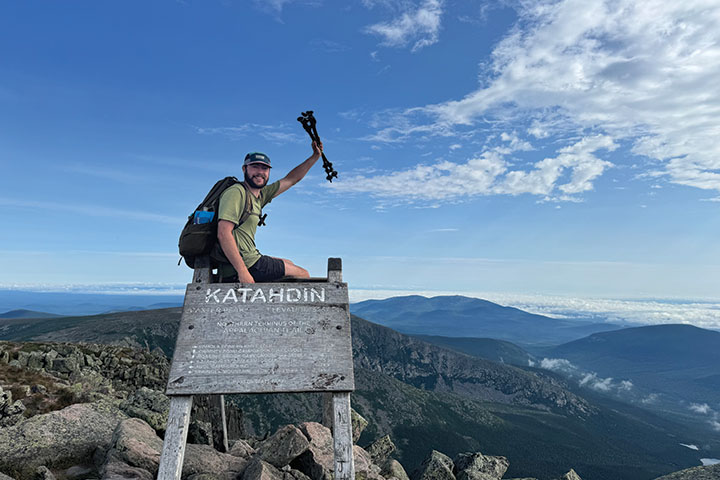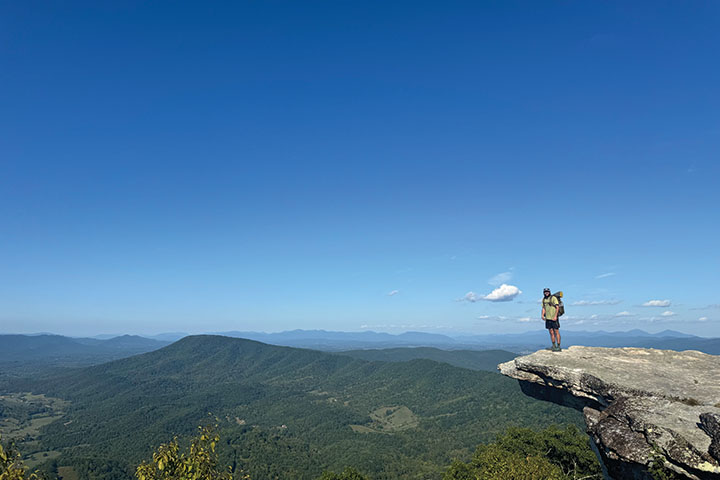Trail Magic & Tapping Trees
By Susan Allen ’09, ‘14

By Susan Allen ’09, ‘14

There’s a place on Earth where everyone is rooting for everyone else’s success, age doesn’t matter, no one is judging appearances and there’s an equal playing field for all.
Ryan Hegarty ‘21, an Environmental Studies graduate who is now a research assistant for the Stockton Maple Project, visited this place, the Appalachian Trail (AT), last year. The journey changed his life.
The AT spans 5 million steps through 14 states with an elevation gain equivalent to summiting Mount Everest 16 times and it’s the world’s longest hiking-only footpath.
Some days reminded him of Christmas as he hiked through spruce forest. Other days, he wore a sweat-drenched shirt that never dried as he battled a heat wave through Vermont. Fresh strawberries never tasted sweeter as he devoured them sitting in the parking lot of a grocery store with all he needed to survive fitting into a backpack.
Only 25% of through-hikers – those attempting to hike an established trail end-to-end –complete the trail. The challenge made him want to lace up his hiking boots even more.

The simplistic lifestyle also called to him. “There were no emails, meetings or traffic. I was totally disconnected,” he said.
He grew up in Pennsylvania 90 minutes from an entrance to the AT and loved exploring the great outdoors as far back as he can remember. Hiking all 2,197.4 miles became a dream.
“Every through-hiker you meet is so happy and enjoying life so much,” he said. He decided he wasn’t going to just listen to all the great stories. He wanted to step into his own story, and he wasn’t waiting until retirement.
During the maple sugaring offseason, he took a leave from work to enter the trail in Pennsylvania for a flip-flop through-hike. On Memorial Day he headed north to Mount Katahdin in Maine. Then, he’d return home to hike to Springer Mountain where the trail ends in Georgia.
The Latin name for red maple, the most common tree that Hegarty taps on Stockton’s campus, is Acer rubrum. Acer means rugged. Acer with an o, Acero, became Hegarty’s trail name.
He reached the northern terminus, completing the first 970 miles through seven states, on July 24, 2024. His dad and brother met him in Acadia, and he returned home to begin his southbound hike.
Although he was far from Stockton’s maple grove, he discovered that life on the trail had striking similarities.
The weather dictates everything, and he learned that “simple doesn’t mean easy.”
“If it was a rainy day, I had to embrace it. You learn quickly that you have to embrace the uncertainty and the unexpected. Every day was different on the trail,” he said.
In theory, tapping a tree to harvest and boiling sap into syrup sounds simple. But the weather doesn’t always cooperate.
If it was a rainy day, I had to embrace it. You learn quickly that you have to embrace the uncertainty and the unexpected. Every day was different on the trail."Ryan Hegarty '21
Sap doesn’t flow until there is a freeze-and-thaw cycle. Configuring the spider web of blue tubing that connects the tapped trees to a vacuum pump for collection requires creativity and hard work.
For example, he suited up in waders and crawled through a storm drain to extend the vacuum tube to a new section of forest as the adopt-a-tree program grows.
“When you’re hiking the trail, you’re spending long hours talking with the people that you’re around and building a community. It’s kind of like the Maple Project when you spend hours sitting around the fire boiling the sap and sharing stories,” he explained.
Most through-hikers start their journey in Georgia in the spring, so when Hegarty got back to the trail in August to head south, he didn’t cross paths with as many hikers, many already above Pennsylvania.
In mid-September, he and a fellow hiker started tracking a developing storm off the Gulf Coast and decided to get off the trail to be safe.
“We thought the storm would pass and we’d be back in a few days. We woke up to an apocalypse,” he recalled.
That apocalypse was Hurricane Helene.
Two days before the storm hit, Hegarty had stayed at Uncle Johnny’s Hostel in Tennessee, which was flattened, and walked over the bridge that crosses the Nolichucky River, which washed away.
“Some of the towns I had just walked through got destroyed like Damascus, Roan Mountain and Erwin. You think about all the people you just met and their communities. It was devastating. You think about all the other thru hikers. There was no cell service after the hurricane to even check in,” he said.
Hegarty witnessed the wrath of Hurricane Sandy that destroyed his family’s New Jersey home, but Helene was different. “This was the first inland hurricane I experienced,” he said.
Hegarty’s through-hike ended just shy of Hot Springs, N.C. After sheltering at a friend’s house in Ashville, he made his way home, but he plans to return to finish the last 320 miles.
The hike inspired him “to continue to do the things that fill me with pride and joy.”
On the trail, he wrote in a journal daily. The first entries were short and noted mileage, weather conditions and what he ate. As the miles added up, his entries began to lengthen with stories of new friendships, wildlife encounters and best days.
As he paged through the entries, he smiled at how many he labeled as "best days." Each day kept getting better.
The best part of the AT hike wasn’t a specific state or scenic view for Hegarty.
“You have countless memories where complete strangers, out of the goodness of their heart, offered hot or cold beverages, offered a place to stay, a ride into town,” he said.
He calls it “trail magic.”
“It’s someone set up in a parking lot with their trunk open full of banana bread, protein bars and Gatorade. Coolers full of drinks set up as water caches in super dry areas where there’s a 20-mile stretch with no water. It’s the community aspect,” he said.
Four pairs of shoes and 1,877.4 miles later, the kindness of strangers “restored my faith in humanity,” he said.